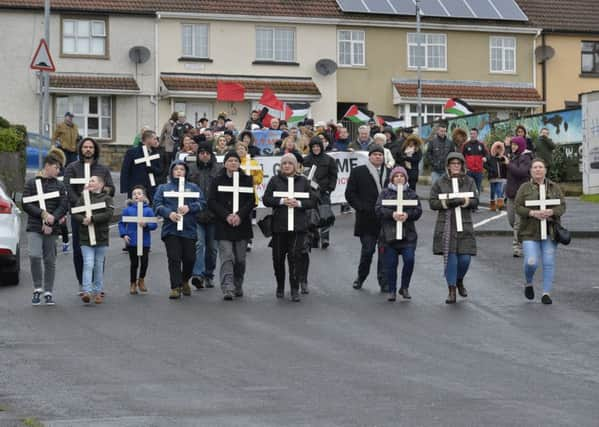Bloody Sunday families reject claim January march '˜thriving'


The relatives have issued a statement in response to claims by the People Before Profit (PBP) organisation which recently defended its decision to take part in a commemoration march last month which was boycotted by a number of groups.
Saoradh and the IRSP, who both withdrew support for the event, claimed the Bloody Sunday March Committee was being politically influenced by the Socialist Workers’ Party and PBP.
Advertisement
Hide AdAdvertisement
Hide AdIn their statement, the families said many of the PBP assertions about the most recent march were “highly inaccurate” and as such, must be challenged.
In particular, they said it was important for them to “set the record straight” on:
* the claim that the Bloody Sunday march was abandoned by Sinn Féin in 2011;
* the description of last month’s march as ‘thriving’;
* the assertion that it was Eamonn McCann who advised the families to set up the Bloody Sunday Justice Campaign in 1992.
Advertisement
Hide AdAdvertisement
Hide AdThe statement read: “In 2011, following the events of June 2010, over 100 direct relatives of those killed and injured on Bloody Sunday issued a clear statement that they would no longer call on the people of Derry and beyond to take part in an annual march and clearly stated that 2011 should be the final annual Bloody Sunday march. More than 30,000 people from Derry and further afield responded in a huge demonstration of support and solidarity. Now, in 2018, this position has not changed for us.”
The families said a PBF claim that Sinn Féin “abandoned” the annual march in 2011 is “simply not true.”
“Those who have made such claims choose to ignore the fact that it was the Bloody Sunday families who met in private, discussed the issue of the march and made their decision and, then, publicly announced that 2011 should be the final annual march. Despite this being done in a very public way in the ‘Derry Journal’ at the time, it really beggars belief that those now claiming to fight for justice can simply choose to ignore it.
“To reiterate, Sinn Fein simply respected the families’ call for an end to the march - they did not abandon the march.”
Advertisement
Hide AdAdvertisement
Hide AdIt is also highly inaccurate, say the families, to state that last month’s march was an example of an event that is continuing to ‘thrive.’
Their statement reads: “In 1998, there were 40,000 on the streets with us; in 2011, there were more than 30,000 on the streets with us; in 2018, less than 300. These facts speak for themselves. Without the support of the vast majority of Bloody Sunday families, any call to march on Bloody Sunday simply cuts no ice with the people of Derry.”
The families end their statement by rejecting an “attempt to give Eamonn McCann almost sole credit for the setting up of the Bloody Sunday Justice Campaign in 1992”.
“While Eamonn was involved in this”, they said, “it was very much a collective effort involving many other people, and especially the family members and others who, then, carried the campaign on.”
The statement was signed by John Kelly, Jean Hegarty (nee McElhinney), Tony Doherty, Kay Duddy, John McKinney, John Nash, Kevin McDaid, Leo Young, Alana Burke and Catherine Gillespie.